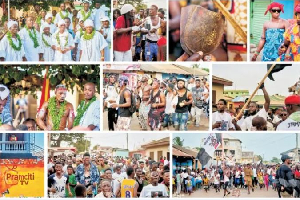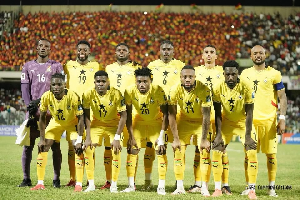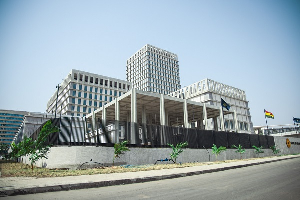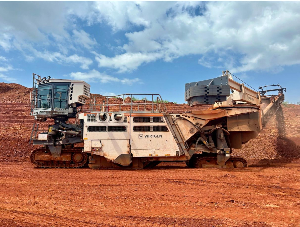The Kpledo Tsoshishi (Beneath the Tree), venue for the Lalue Kpledo celebration, is a happy place. The sounds of the Kple Mie or drum is enough to lure people to dance; and the dance pattern varies and follows no specific rule. The actors must show respect to each other on the dance floor and must be barefooted. It is forbidden to wear footwear to a place considered sacred.
For the people of Prampram, the Kpledo is not just a dance; it a veneration of the gods and the tireless efforts by the forebears toward the formation of Prampram as an iconic town. And for decades, the tradition continues to be passed on to successive generations. But the form and style have not been tampered with, thanks to existing cultural norms that provide a safeguard for the purity of the customs and traditions.
Through dance, composition of songs and costumes, the present generation has elevated the festival to another level, including digitising it for global consumption. As parts of the themes to be explored for the celebration this year, a Remembrance Day will be held to explore the towns relationship with the slave trade and how the festival provides a healing and liberating feel for diasporans from America, Europe and the Caribbean, who are contributing to the economy of the town.
Prior to the present-day Accra becoming the capital of the Gold Coast/Ghana, Prampram was one of the major trading points for colonial merchants. Using the town as a route, the merchants routed bales of wax prints and alcohol through the lands and the shores. The European merchants also set up checkpoints to collect taxes from rival merchants and their local agents.
Apart from these commodities, the Europeans also exploited the space as an open market for the purchase and shipment of slaves to Europe and the Americas. There is a belief that some of the slaves were captured during celebrations like the Kple. Kwame Akoto-Bamfo, the multi-disciplinary artist who runs the Nkyinkyim museum in Ada, has documented these stories in the form of sculptures.
The story of slavery and the loss of identity is well-documented. The rise in the search for ancestral connection by most Africans in the diaspora is indicative of the importance of cultural heritage. Therefore, the void felt by most of them is what festivals like the Lalue Kpledo provides. And for those who have interacted with the celebration, it represents the healing they had – for many years – been searching for.
As a coastal town, Prampram was also a hotbed for slave trading. The town also experienced a wave of resistance put forward by indigenous people who confronted the colonialists and fought them to the very end. Unfortunately for them, and as it has always been, the slave merchants found an accomplice from within the town – a blacksmith, who allegedly built strong shackles that were later used to transport the captured slaves.
For years, he worked with these Europeans until his cover was blown and he disappeared from the town. He was said to have surfaced in present-day Jamestown, where he integrated into the community, and continued with his trade until his death.
Again, Prampram was a key ally to the Danes in their battle against the Dutch and Fantes on one side. These historic moments embedded in the capture and sale of slaves on the shores of Prampram are gradually finding themselves back into the bigger narrative of the overall thoughts behind the festival.
So for those who are tickled into the dance floor by the sound of the sacred drum, it is a period of reflection, liberation and thanksgiving. It is liberating because of the unhindered freedom to embrace one's heritage, while contemplating the enormous sacrifices generations have made toward the preservation of the culture.
Speaking to residents about the future of the Kpledo, there is a good feeling things are heading in the right direction. The Paramount Chief, Nene Tetteh Wakah III, the Prampram Traditional Council and elders from the various quarters have worked tirelessly behind the scenes to resolve pockets of conflicts that had hitherto reflected poorly on the town’s image.
The unity has equally been embraced by the residents, who have happily tagged along. Agbotue, a group known in the town for being notorious, has even embraced the peace.
In a recent interview with PramcitiTV, a popular channel within the GaDangme space based in Prampram, conducted a thorough interview with the leadership of the group and they pledged to work for the collective good of Prampram. The group backed its pledge up with a well-attended clean-up exercise.
Hopefully, with the second and third celebrations in the offing, there is a greater sense of ownership of the festival by the town folks who are determined to continue the legacy from where their aged parents have left of. After all, the Lalue Kpledo embodies the heart and soul of their being.
Regional News of Sunday, 19 May 2024
Source: Anny Osabutey, Ronnie Botchwey and Alvin Nii Okai Kasabrofo













